Introduction
AI in medicine is no longer a distant dream—it’s already changing the way doctors diagnose, treat, and care for patients. From faster disease detection to personalized treatment plans and smarter hospital systems, artificial intelligence is transforming healthcare in powerful ways. In this blog post, we explore how AI is making an impact across key areas like diagnostics, surgery, drug discovery, and more.
AI in Diagnostics
As a doctor, one of the most critical parts of our job is diagnosing patients accurately and quickly. Thanks to advancements in technology, AI in medicine is becoming a powerful assistant in this process—especially in diagnostics.
AI-powered systems are now able to analyze medical images such as X-rays, MRIs, and CT scans with amazing speed and accuracy. These tools have been trained on thousands—even millions—of examples, allowing them to spot patterns that the human eye might miss.
AI is already helping us detect serious conditions like:
- Cancer (breast, skin, lung, and more)
- Stroke (identifying blockages or bleeding in the brain)
- Pneumonia (especially on chest X-rays)
- Eye diseases like diabetic retinopathy
In many cases, AI can give doctors a second opinion in seconds, helping us make better decisions—especially when time matters most. Early detection leads to faster treatment, fewer complications, and ultimately, more lives saved.
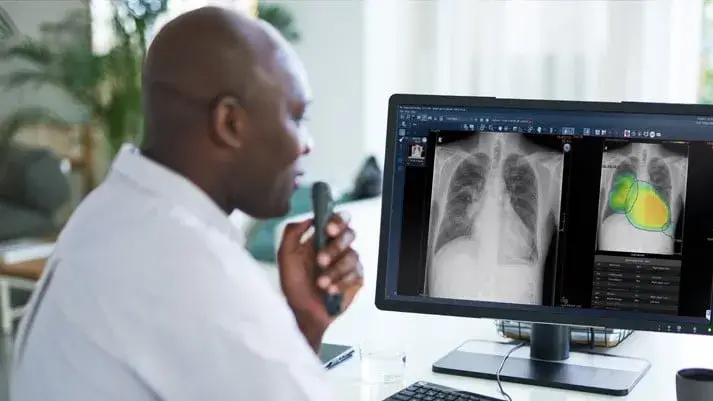
AI in Drug Discovery
As a doctor, I’ve seen how important the right medicine can be. But what many people don’t realize is that discovering a new drug can take 10–15 years—and billions of dollars. That’s a long time, especially when patients are waiting for life-saving treatments.
This is where AI in medicine is making a huge difference.
🚀 How AI Speeds Up Drug Discovery
Traditionally, researchers test thousands of chemical compounds in the lab to find one that might work. But AI can do much of this testing virtually, by analyzing data and predicting which compounds are likely to be effective.
Here’s how AI helps:
Predicts how molecules behave in the body
AI can forecast how a potential drug will interact with proteins, cells, or even side effects—before any lab test is done.
Finds the best drug candidates
It scans huge amounts of biomedical data (like genetic information or disease pathways) to suggest new drug ideas that humans might miss.
Simulates clinical trials
Instead of testing every drug on real patients first, AI can simulate how a trial might go—saving time, money, and reducing risks.
💊 Real-World Examples
Major companies like Pfizer, Moderna, and Roche are now using AI to speed up vaccine development, cancer treatments, and other advanced medicines. For example, Moderna used AI to help design and test its COVID-19 vaccine in record time.
🧠 Why It Matters
As a tech enthusiast, I see this as a huge win. AI doesn’t replace human researchers—it supercharges their work. It’s like having a supercomputer assistant that never sleeps, helping us find better treatments faster and smarter.
AI in Surgery
Surgery has always been one of the most delicate parts of medicine. Every movement matters, and even the smallest mistake can lead to complications. That’s why the rise of AI in medicine, especially in surgery, is such an exciting development.
🤖 How AI Supports Surgeons
Today, robotic surgery systems are being enhanced with artificial intelligence. These smart systems don’t work alone—they assist real surgeons like me by improving what we already do.
Here’s how:
Real-time decision-making
AI can analyze data from the patient and the surgical tools during the operation. It can alert us if something unexpected happens, such as too much bleeding or abnormal tissue patterns.
Precision movement
Robotic arms, guided by AI, can move in ways that are steadier and more precise than a human hand. This helps especially in microsurgeries or procedures in tight areas like the brain or spine.
3D planning before surgery
Before the operation even begins, AI helps create detailed 3D models of the patient’s organs or bones using scans. This helps us plan every step with better accuracy.
💡 Real Benefits for Patients
- Smaller cuts (less invasive surgery)
- Faster recovery times
- Lower risk of infection or complications
AI doesn’t replace the surgeon—but it acts like a highly intelligent assistant that helps us do our job better, faster, and more safely.
🧠 From a Tech Enthusiast’s View
As someone who loves technology, I see AI in surgery as a perfect example of human skill + machine intelligence. It’s not about replacing doctors—it’s about enhancing us.
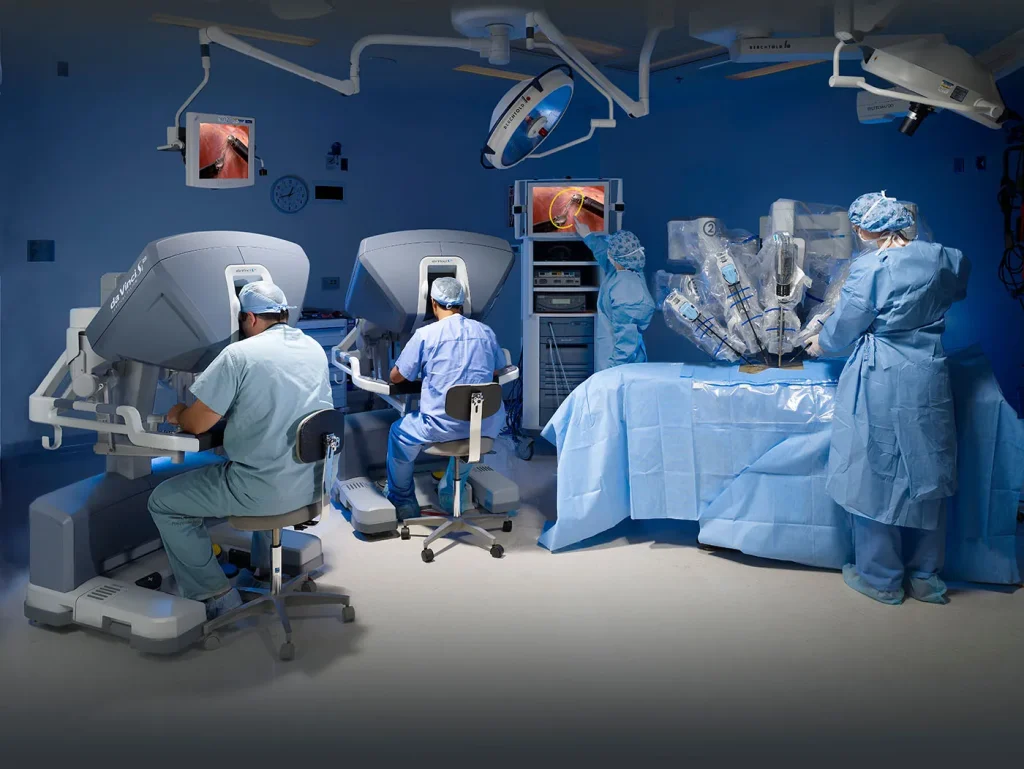
AI in Personalized Medicine
As a doctor, I’ve seen how different patients can respond very differently to the same treatment. That’s why the traditional “one-size-fits-all” approach in healthcare is no longer enough. Thanks to AI in medicine, we’re now able to offer personalized treatments—care that’s tailored to each individual.
🧬 How AI Makes Medicine Personal
AI systems can analyze massive amounts of patient data—including:
- Genetic information (genome)
- Lifestyle factors (like diet, activity level, or sleep)
- Medical history (past treatments, allergies, conditions)
By putting all of this data together, AI helps doctors create custom care plans that match the specific needs of each patient.
🎯 Real-Life Benefits
Fewer side effects
- Because treatments are designed specifically for you, your body is less likely to react badly.
Better treatment outcomes
- Personalized medicine increases the chances that a treatment will actually work—especially in complex diseases like cancer or autoimmune conditions.
Targeted cancer therapies
- AI can help identify which cancer drugs will be most effective based on your genetic makeup and the genetic profile of the tumor. This means smarter, more focused treatment with less trial and error.
💡 Why It Matters
As a tech enthusiast, I’m amazed at how AI can unlock the power of data to improve lives. This is the future of medicine: not just treating the disease—but treating the person.
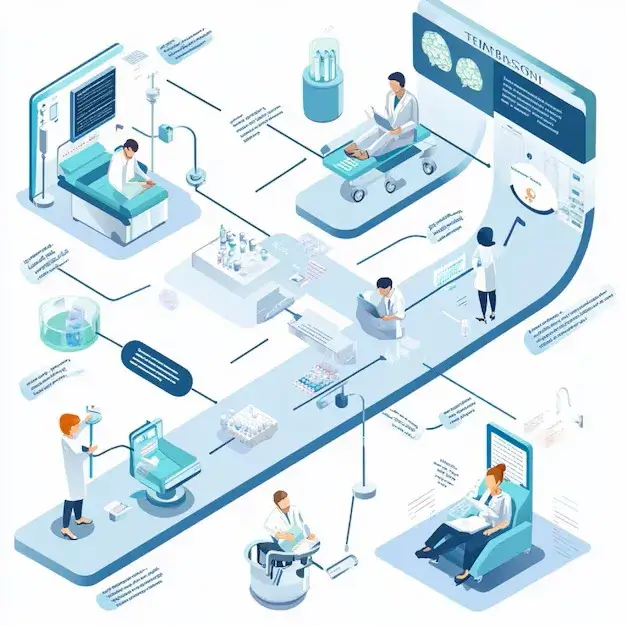
AI in Hospital Management
When people think about AI in medicine, they usually imagine high-tech tools in the operating room or lab. But some of the biggest benefits of AI happen behind the scenes—in hospital management.
Running a hospital involves thousands of small tasks every day. Scheduling, paperwork, billing, patient flow—it all needs to be done smoothly. That’s where AI comes in, helping hospitals work faster, smarter, and more efficiently.
🏥 What AI Does in Hospital Operations
Optimizes staff schedules
- AI looks at staff availability, patient needs, and department workload to create better shift schedules. This helps reduce stress on doctors and nurses while ensuring patients get proper care.
Manages Electronic Health Records (EHR)
- AI helps organize and update patient records automatically. It can even pull out key details to help doctors make quicker decisions.
Automates billing and admin tasks
- Instead of relying on manual paperwork, AI can handle billing codes, insurance processing, and appointment reminders. This reduces human error and saves hours of admin time.
Predicts patient admissions
- By analyzing past data and current trends, AI can forecast how many patients are likely to come in. This helps hospitals prepare resources like beds, equipment, and staff in advance.
💡 Real Benefits
- Saves time for medical staff
- Reduces costs for hospitals
- Improves overall patient experience(Less waiting, smoother check-ins, quicker discharge)
🧠 Doctor + Tech View
As a doctor, I value time. As a tech lover, I value smart solutions. AI in hospital management gives us both—more time with patients and fewer headaches from paperwork.
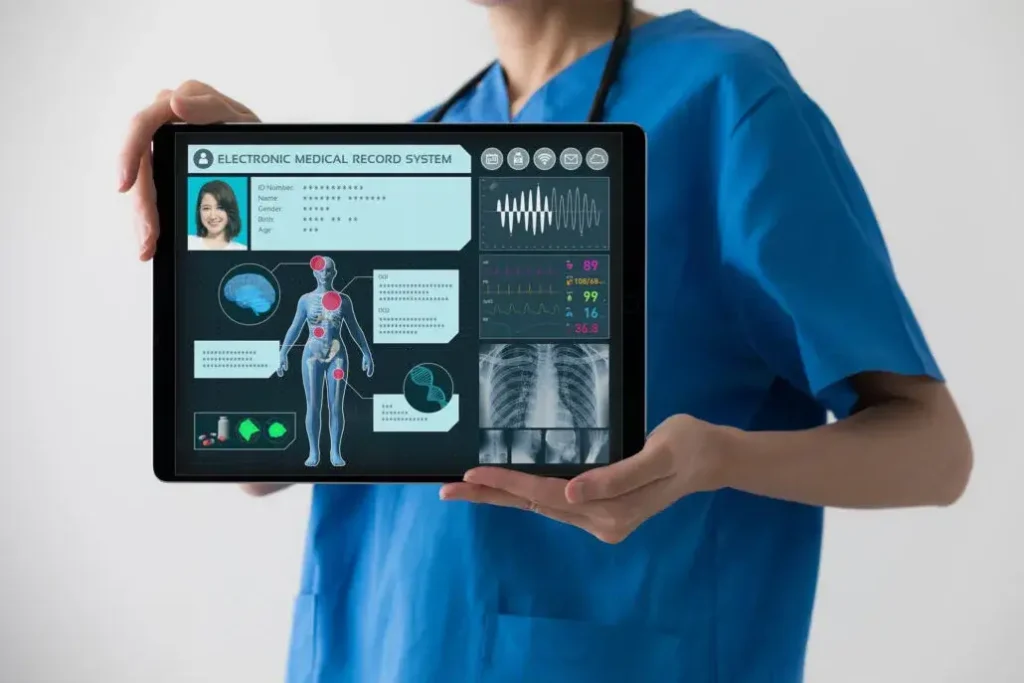
AI in Remote Monitoring
Imagine if your doctor could keep an eye on your health—without you even stepping into the clinic. That’s now possible with AI in medicine, especially through remote monitoring.
Using smart devices like wearables and sensors, AI can track your health in real time. This is especially helpful for elderly patients or those with chronic diseases like heart problems, diabetes, or sleep disorders
📡 How AI-Powered Remote Monitoring Works
Today’s smart devices (like smartwatches, fitness bands, and medical sensors) are more than just gadgets—they’re mini health assistants.
They can monitor:
- Heart rate
- Blood pressure
- Oxygen levels (SpO₂)
- Sleep patterns
- Glucose levels (in diabetic patients)
AI takes the data collected and analyzes it instantly. If it spots anything unusual—like a dangerously low heart rate or signs of poor oxygen flow—it can alert doctors or caregivers immediately.
👩⚕️ Real-Life Benefits
Faster response to emergencies
- Patients can get help before a condition becomes serious.
24/7 health tracking
- No need to wait for a check-up. AI is watching over your health all the time.
Peace of mind for families
- Especially for elderly loved ones living alone, AI monitoring ensures help is just a signal away.
🧠 Doctor’s Note
As a doctor, I can say this kind of early detection can save lives. And as a tech enthusiast, I see AI turning everyday wearables into powerful health tools—right on your wrist or in your pocket.
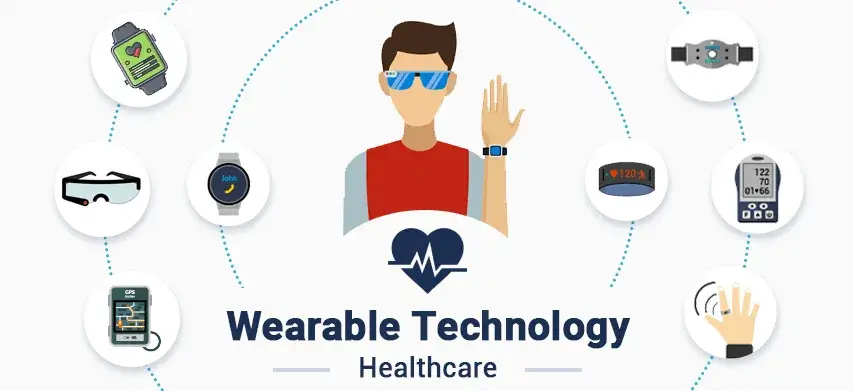
AI in Mental Health
Mental health is just as important as physical health—but it often doesn’t get the attention it deserves. With long wait times and limited access to therapists, many people struggle alone. Thankfully, AI in medicine is changing that by making mental health support more accessible and responsive.
🧠 How AI Supports Mental Health
Today’s AI-powered mental health apps go far beyond basic advice. They use smart technologies to actually understand how a person feels—and respond with support.
Here’s how they work:
Mood detection through voice, text, and facial analysis
- AI can pick up on tone of voice, word choice, typing speed, and even facial expressions to detect signs of anxiety, depression, or stress. This helps the app adjust its responses to suit the user’s emotional state.
Chatbot-based therapy
- Some apps use AI chatbots to simulate conversations similar to therapy. These chatbots listen, ask helpful questions, and offer coping techniques. While they don’t replace real therapists, they can offer immediate support any time of day.
Guided meditation and stress-relief programs
- AI tailors exercises like deep breathing, meditation, and journaling based on your mood and progress, making it easier to stay consistent with mental wellness routines.
✅ Real Benefits
24/7 access to support
AI tools are available any time, day or night.
Lower cost
Many apps are free or affordable, making mental health care more accessible.
Reduced stigma
People can get help privately, which is a big step for those who are hesitant to seek therapy in person.
💡 Doctor’s Insight
As a doctor, I see the value of human connection in therapy—but AI tools fill an important gap. And as someone who loves tech, I believe this is one of the most impactful ways AI is improving lives.
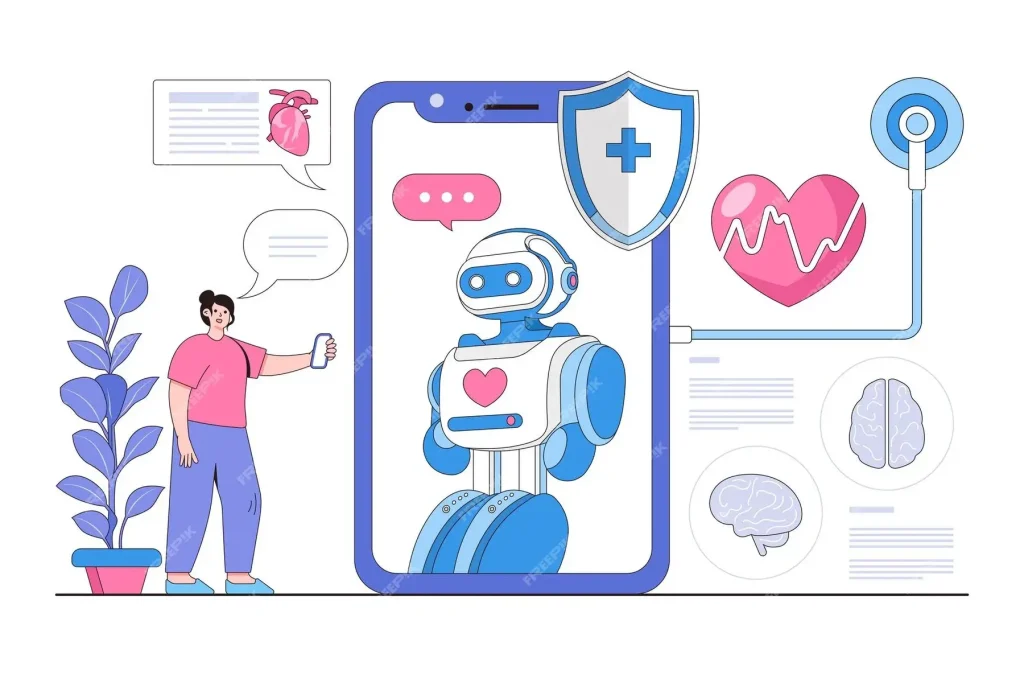
AI in Epidemiology and Public Health
When a disease starts to spread, time is everything. The faster we understand what’s happening, the faster we can save lives. This is where AI in medicine plays a powerful role—especially in epidemiology (the study of how diseases spread) and public health.
🌍 How AI Helps Fight Disease Outbreaks
AI systems are great at analyzing huge amounts of data very quickly. This means they can:
Track the early signs of outbreaks
AI scans news reports, social media posts, and health records from around the world to detect unusual patterns—often before official cases are reported.
Predict how diseases will spread
Using infection data, travel patterns, and population behavior, AI can model where a virus might go next. This helps governments and hospitals prepare in advance.
Optimize vaccine and resource distribution
AI helps decide which areas need vaccines, doctors, or supplies the most—making sure help reaches people faster and more fairly.
🦠 Real Example: COVID-19
During the COVID-19 pandemic, AI was used to:
Predict virus hotspots
Tools like BlueDot warned about COVID-19 before major global alerts were issued.
Analyze real-time data
Governments used AI to track cases, hospitalizations, and vaccine rollouts.
Plan smarter responses
AI models guided lockdowns, testing strategies, and vaccine delivery routes.
✅ Real Benefits
- Faster response = fewer deaths
- Better use of limited resources
- Improved coordination across cities and countries
💡 Doctor’s Perspective
As a doctor, I rely on real-time information during outbreaks. And as a tech enthusiast, I’m excited about how AI turns global data into smart, life-saving decisions. AI in public health is like having a digital radar for diseases—and that’s a huge win for everyone.
AI in Clinical Decision Support
Even the best doctors sometimes need help making tough decisions. That’s where AI in medicine provides powerful support—by giving doctors a “second opinion” based on data, not just guesswork.
This is called Clinical Decision Support (CDS), and it helps doctors make smarter, faster, and safer choices for their patients.
🧠 How AI Supports Medical Decisions
AI systems can analyze millions of medical records, test results, research papers, and past case histories in seconds. Using this information, they can:
- Suggest possible diagnoses
For example, if a patient has symptoms that match several illnesses, AI can narrow it down to the most likely ones based on data and patterns.
- Recommend treatment options
AI might suggest which medications or therapies are likely to work best based on the patient’s age, medical history, and other conditions.
- Identify risk factors
AI can spot things a doctor might miss—like a hidden risk of stroke or cancer—based on subtle signs in the data.
👩⚕️ Why It Matters
Doctors are human, and medical decisions can be complex. With AI as a backup:
- Mistakes are reduced
It acts as a safety net, catching things we might overlook.
- Time is saved
Especially in emergency situations where quick action is critical.
- Care becomes more personalized
AI can tailor suggestions to the unique profile of each patient.
✅ Real Benefits
- Better outcomes for patients
- Greater confidence in tough decisions
- Stronger doctor-patient trust when care is clearly backed by data
💡 Doctor’s Insight
As a practicing doctor, I’ve seen how AI tools help guide my thinking, especially in rare or difficult cases. And as someone passionate about technology, I believe this is one of the most exciting ways AI is directly helping both doctors and patients.
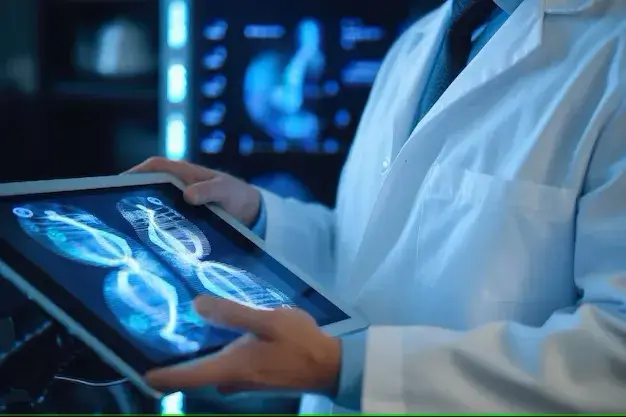
AI in Medical Education and Training
Training to become a doctor is one of the most challenging journeys. It takes years of study, practice, and experience. But now, AI in medicine is making this process smarter and more effective.
Medical schools and hospitals are using AI and virtual reality (VR) to help students and trainees learn faster, make fewer mistakes, and gain confidence before treating real patients.
🎓 How AI is Changing Medical Training
AI tools are used in classrooms, simulation labs, and online platforms to:
- Provide real-time feedback
During practice sessions, AI can instantly tell a student if they made a mistake or how to improve—for example, if a surgical incision was too deep or if a diagnosis was incorrect.
- Customize training for each student
AI tracks a learner’s strengths and weaknesses. Then, it builds a personalized study plan that focuses on what the student needs to practice most.
- Create realistic simulations
With AI and VR, students can now experience lifelike surgeries, emergency room scenarios, and patient interactions. These simulations feel real and prepare students for real-world situations without any risk to actual patients.
🏥 Benefits for Future Doctors
- More hands-on experience without real risk
Students can practice as many times as needed.
- Faster learning
Instant feedback helps students improve quickly.
- Better preparedness
By the time they work with real patients, they’re more confident and skilled.
💡 Doctor’s Insight
As someone who’s been through the long road of medical training, I truly wish these tools were available earlier. And as a tech lover, I’m excited to see how AI in medical education is shaping the next generation of doctors to be better prepared, safer, and more capable than ever before.
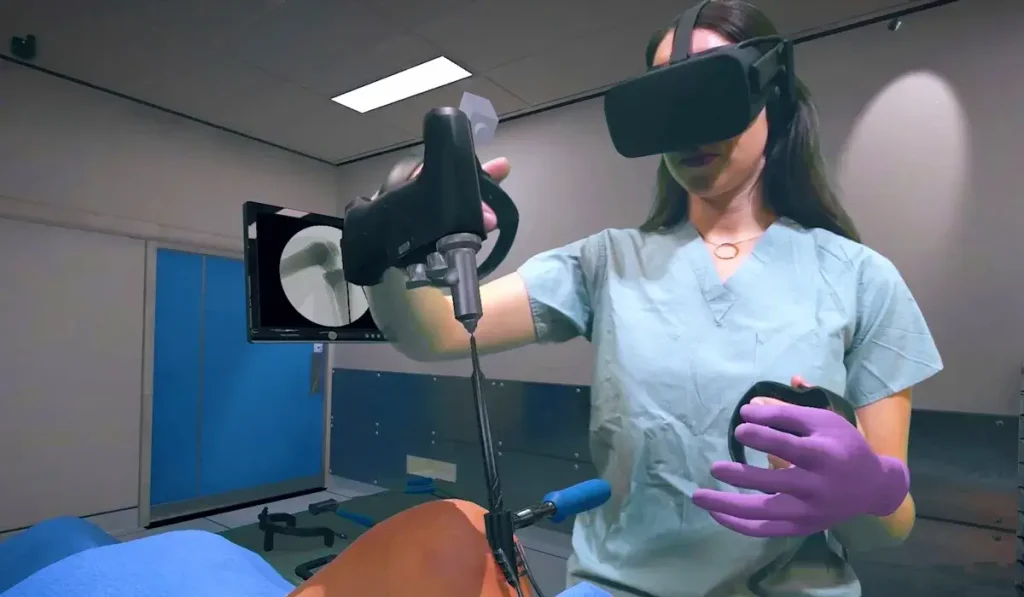
Conclusions
From diagnosing diseases faster to helping surgeons operate with precision, AI in medicine is transforming every part of healthcare. It’s not just about futuristic robots—it’s about real tools that are saving lives, speeding up treatments, and improving patient outcomes right now.
As we’ve explored across categories like diagnostics, drug discovery, surgery, personalized care, and hospital management, AI is proving to be a powerful partner to doctors, nurses, researchers, and even patients themselves.
Why This Matters
- Patients get better, faster care
- Doctors make more confident decisions
- Hospitals run more efficiently
- Training becomes smarter and safer
AI won’t replace human care—but it will enhance it. The goal is to use technology to support medical professionals, not replace them. Together, AI and human expertise can create a future where healthcare is more accurate, personalized, and accessible to all.
What’s Next?
As AI continues to evolve, we’ll likely see:
- More predictive and preventive tools
- Better integration across healthcare systems
- Stronger ethical guidelines for responsible use
If you’re a medical professional, tech enthusiast, or just someone interested in the future of health, now is the time to stay informed and engaged with how AI in medicine is shaping our world.